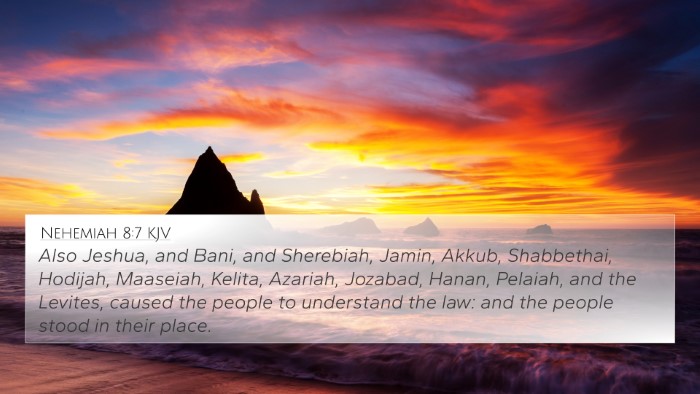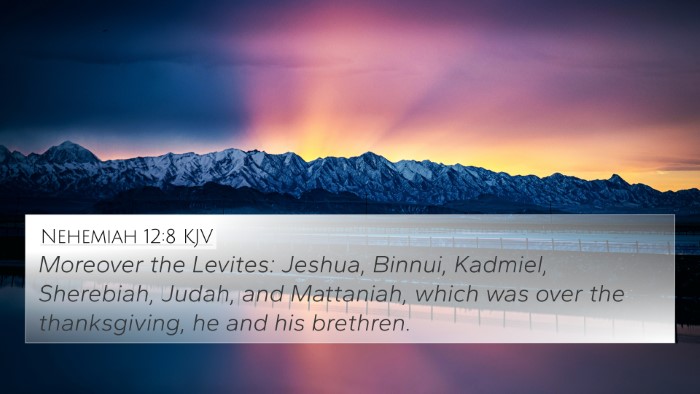Meaning and Interpretation of Nehemiah 10:12
Nehemiah 10:12: “And we would not give our daughters to the people of the land, nor take their daughters for our sons.”
Contextual Overview
The verse is part of a larger narrative where the Israelites, having returned from Babylonian exile, committed themselves to follow God’s commandments and uphold their covenant with Him. Here, we see a communal pledge focusing on maintaining their distinct identity in the face of surrounding pagan cultures.
Thematic Insights
This verse emphasizes the importance of separation from surrounding nations, particularly concerning intermarriage. The concern was not only about cultural differences but also about maintaining spiritual fidelity to Yahweh.
- Preserving Identity: Protecting their cultural and religious identity was paramount amidst external influences.
- Spiritual Integrity: The Israelites recognized that intermarriage could lead to idolatry and falling away from God.
- Covenantal Commitment: This commitment reflects a broader covenantal relationship that the Israelites had with God.
Public Domain Commentary Insights
Matthew Henry: Henry emphasizes the implications of this vow as a serious commitment to uphold God's statutes, showcasing the dangers of mingling with those who do not worship the God of Israel.
Albert Barnes: Barnes considers this pledge in the context of the law given to Israel regarding the prohibition of intermarriage with foreign nations, linking it to earlier scriptures (Exodus 34:16; Deuteronomy 7:3).
Adam Clarke: Clarke suggests that this decision was based on historical lessons learned by Israel, where the past intermarriages had led them into sin, thus reiterating the need for their current vow as a measure of protection against spiritual decline.
Cross-References to Nehemiah 10:12
- Exodus 34:16: "And you take of their daughters for your sons, and their daughters go a-whoring after their gods..." - A direct warning against intermarriage.
- Deuteronomy 7:3: "Neither shalt thou make marriages with them; thy daughter thou shalt not give unto his son..." - Reinforcement of the idea of separation.
- Ezra 9:1-2: Ezra laments the marrying of foreign women, leading to sin as a pattern from Israel's history.
- Malachi 2:11: "Judah hath dealt treacherously, and an abomination is committed in Israel and in Jerusalem..." - Discussing unfaithfulness through intermarriage.
- 1 Kings 11:1-2: The example of Solomon’s wives leading him away from the Lord illustrates the consequences of such unions.
- Joshua 23:12-13: Warning against alliances that could lead the heart away from God.
- 2 Corinthians 6:14: "Be ye not unequally yoked together with unbelievers..." - A New Testament affirmation of the same principle of separation.
Application and Reflection
Nehemiah 10:12 invites individuals today to consider the influences in their lives, emphasizing the necessity of surrounding oneself with likeminded believers. The concepts of spiritual and communal integrity presented here have resonances throughout scripture, highlighting God's desire for His people to remain holy and devoted to Him.
As modern believers reflect on this verse, they are encouraged to examine their relationships, affiliations, and commitments, ensuring they align with God’s teachings and guidelines. Marriage, fellowship, and partnerships should reflect a devotion to the principles found in scripture.
Resources for Cross-Referencing
For those seeking to explore Bible verse cross-references, several tools can aid in this study:
- Use a Bible concordance to identify themes and verses related to Nehemiah 10:12.
- Consult a bible cross-reference guide that provides thematic connections and additional scriptures.
- Engage in Bible cross-reference study techniques, such as creating personal notes and thematic charts.
- Utilize comprehensive Bible cross-reference materials which may include commentaries and study notes.
Conclusion
Nehemiah 10:12 serves as a poignant reminder of the principles of holiness and separation which are timeless within the Christian faith. Through the examination of this verse and its connections to both Old and New Testament scriptures, believers are equipped to understand the importance of their commitments and relationships. The blessings of fidelity to God's word bring spiritual prosperity, while deviation can have costly consequences.





